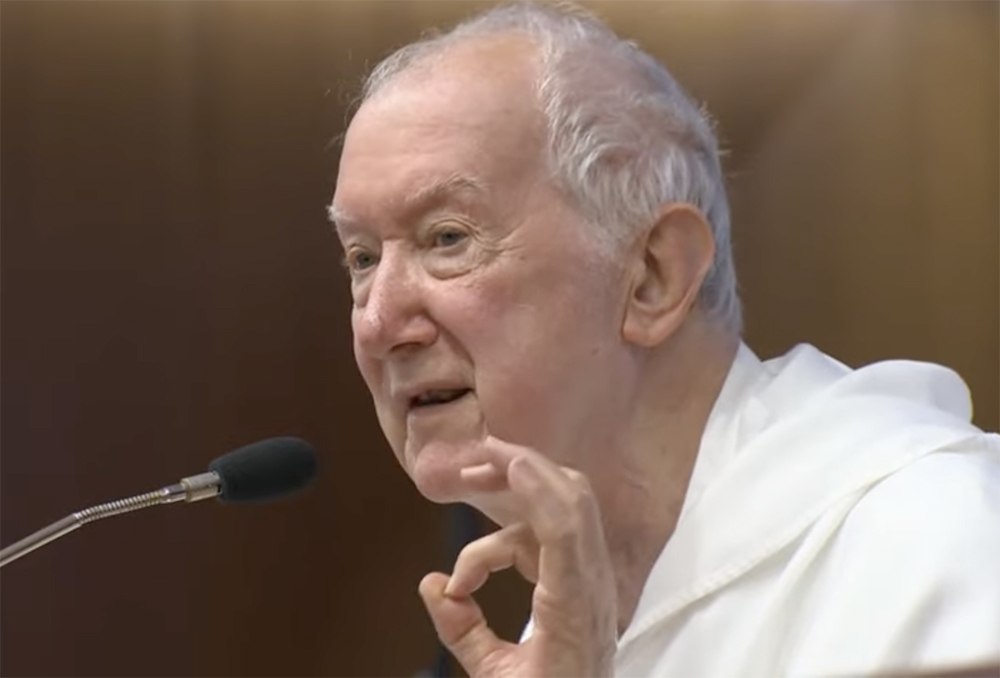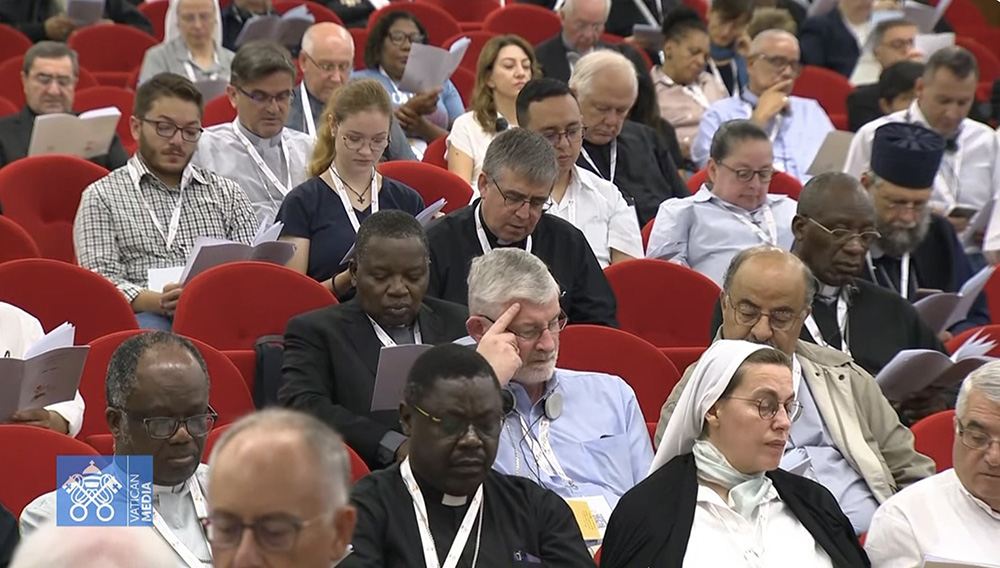
Dominican Fr. Timothy Radcliffe gives a meditation at the retreat outside of Rome for members of the assembly of the Synod of Bishops on Oct. 2. (NCR screenshot/YouTube/Vatican Media)
Dominican Fr. Timothy Radcliffe preached the retreat to the synod participants this week, in advance of the official opening today. I would have preferred something a little more vertical, and less horizontal, with greater recognition of the mysteries that surround us Christians on our pilgrim path. Still, Radcliffe did an admirable job of placing the synodal discussion in a specifically ecclesial key, in which the Christocentric focus of Vatican II shone through.
"Some of us are afraid of this journey and of what lies ahead. Some hope that the church will change dramatically, that we shall take radical decisions, for example about the role of women in the church," Radcliffe explained to the assembled synod delegates. "Others are afraid of exactly these same changes and fear that they will only lead to division, even schism. …
"At crucial moments in the Gospel, we always hear these words: 'Do not be afraid.' St. John tells us, 'Perfect love casts out fear.' So let us begin by praying that the Lord will free our hearts from fear. For some, this is the fear of change. For others, the fear that not much will change."
He acknowledges the challenges but explains that our Christian hope, rooted in the "perfect love" of Jesus Christ, can conquer that fear.
'Let us begin by praying that the Lord will free our hearts from fear. For some, this is the fear of change. For others, the fear that not much will change.'
Radcliffe became more specific as his talk went on. The hope needed must be a shared hope, which seems, in the polarized landscape we inhabit, like a distant hope. Radcliffe compares the situation the synod delegates face to that of the disciples, and the passage is worth quoting at length:
But, my brothers and sisters, here is the difficulty: We have contradictory hopes! So how can we hope together?
In this, we are just like the disciples. The mother of James and John hoped that they would sit on the left and right of the Lord in his glory and so displace Peter; there was rivalry even within the closest circle of Jesus' friends. Judas hoped probably for a rebellion that would overthrow the Romans. Some of the disciples just hoped not to get killed. But they walked together.
So what shared hope can we have at this synod? At the Last Supper, they received a hope beyond all they could have imagined: the body and blood of Christ, the new covenant, eternal life. In the light of this eucharistic hope, all their conflicting hopes must have seemed as nothing, except to Judas who despaired. This is what St. Paul calls "hoping against hope" [Romans 4:18], the hope that transcends all of our hopes.
The words "except to Judas who despaired" should cause even the most determined of Christians to pause and consider the lump in her throat. It is the eucharistic hope that allowed the disciples to overcome their conflicting hopes, but despair, the absence of hope, brings ruin, betrayal and death. And, again, it is clear that only in following Christ can the church move forward.
Advertisement
Radcliffe continued to reflect on the behavior and attitudes the disciples displayed in the Gospel, as both a model and, at times, an anti-model for the synod:
They [the disciples] looked useless. But when the vast crowd gathered around Jesus, the disciples asked the Lord, "How can we feed these people with bread here in the desert?" Jesus asks them for what they have, just seven loaves and a few fish [Mark 8:1-10]. That's more than enough.
If we give generously whatever we have in this synod, it will be more than enough. The Lord of the harvest will provide.
The adverb "more" carries specific theological significance. It speaks to that superabundance that is the hallmark of God's grace, something that exceeds our expectations and our grasp.
In his second talk, Radcliffe pointed to a different point of tension within the life of the church, not conflicting hopes but conflicting ecclesial identities, our different understandings of what we think the Catholic Church should be.
"For some of us, the idea of a universal welcome, in which everyone is accepted regardless of who they are, is felt as destructive of the church's identity. ... They believe identity demands boundaries. But for others, the very heart of the church's identity is to be open," Radcliffe said.
He went on to note, "This tension has been with us ever since Abraham left Ur. Right from the beginning, the Old Testament held in tension: the idea of election, God's chosen people, the people with whom God dwells, an identity that is to be cherished and loved. But also universalism, openness to all the nations, an identity which is to be discovered."
'Christian identity is always known and unknown, given now and yet to be sought.'
The corollary in the New Testament is most evident in 1 John 3:2: "Beloved, we are God's children now; what we will be has not yet been revealed."
Radcliffe states, "Christian identity is always known and unknown, given now and yet to be sought."
He then continues to explore not just the tension but the necessity of the tension:
All theology springs from tension, which bends the bow and shoots the arrow. This tension is at the heart of St. John's Gospel. God makes his home in us: "Those who love me will keep my word, and my Father will love them, and we will come to them and make our home with them" [14:23]. But Jesus also promises our home in God: "In my Father's house, there are many dwelling places. If it were not so, would I have told you that I go to prepare a place for you?" [14:2].
Radcliffe's erudition is matched here by his spiritual insights. He puts his finger on the tensions, and soothes them with the balm of Scripture. It is masterful.
The third conference focused on friendship and it is exquisitely well done. I recommend everyone watch it and ponder it. In terms of the synod, he cites Graham Greene's Monsignor Quixote, in which the priest and the communist mayor "make a holiday," during which they share not only their hopes but their doubts. The priest reflects, "It is odd how sharing a doubt may bring people together perhaps even more than sharing a faith. The believer will fight another believer over a shade of difference; a doubter fights only with himself."
Radcliffe concludes that session with words the Spanish priest in the novel might have said if he were a delegate to the synod: "Friendship flourishes when we dare to share our convictions and our doubts and seek the truth together. What's the point of talking to people who already know everything or completely agree? How are we to do this?"

Members of the assembly of the Synod of Bishops recite morning prayer during their retreat outside of Rome in this screen grab from Oct. 3. (CNS/YouTube/Vatican Media)
The fourth conference, the last one available to me before press time, began with a reflection on the Gospel story of the disciples on the road to Emmaus. This story also figured in Bishop Robert Barron's criticism of papal biographer Austen Ivereigh, which I discussed here. It is an iconic story with just enough ambiguity for different people to draw different conclusions. Radcliffe's exegesis seems more fertile than Barron's. Radcliffe notes:
The disciples are running away from the communion of the church, like so many people today. Jesus doesn't block their way or condemn them. He asks, "What are you talking about?" What are the hopes and disappointments that stir in your hearts? The disciples are speaking angrily. The Greek means literally, "What are these words you are hurling at one other?"
So Jesus invites them to share their anger. They had hoped Jesus would be the one to redeem Israel, but they were wrong. He failed. He walks with them and opens himself to their anger and their fear.
Radcliffe teases out the meaning of the story from various angles, leading to the necessity of listening, of hearing each other, if the synod is to succeed. He draws on the experience of his order:
We listen not just to what people are saying but what they are trying to say. We listen for the unspoken words, for which they search. ... We listen for how people are right, not for how they are wrong, for their grain of truth, even if what they say we believe to be mistaken. We listen with hope, not with contempt.
We have one rule in the General Council of the Dominican Order. Never dismiss what a brother says as nonsense, because that is to rubbish them. They may be misinformed; they may be arguing illogically; they may be simply wrong. But even in their wrongness, there is something that I must hear. We are mendicants after the truth.
If Radcliffe had said nothing else, the phrase "We are mendicants after the truth" would have earned him the gratitude of the synod delegates.
Radcliffe's reflections are a good means by which those of us who will not be in the aula can prepare ourselves for the synod, too, a good way to distinguish the noise outside the hall from what we hope will be intensive listening inside, an opening to prayerfully accompany the synod delegates.







